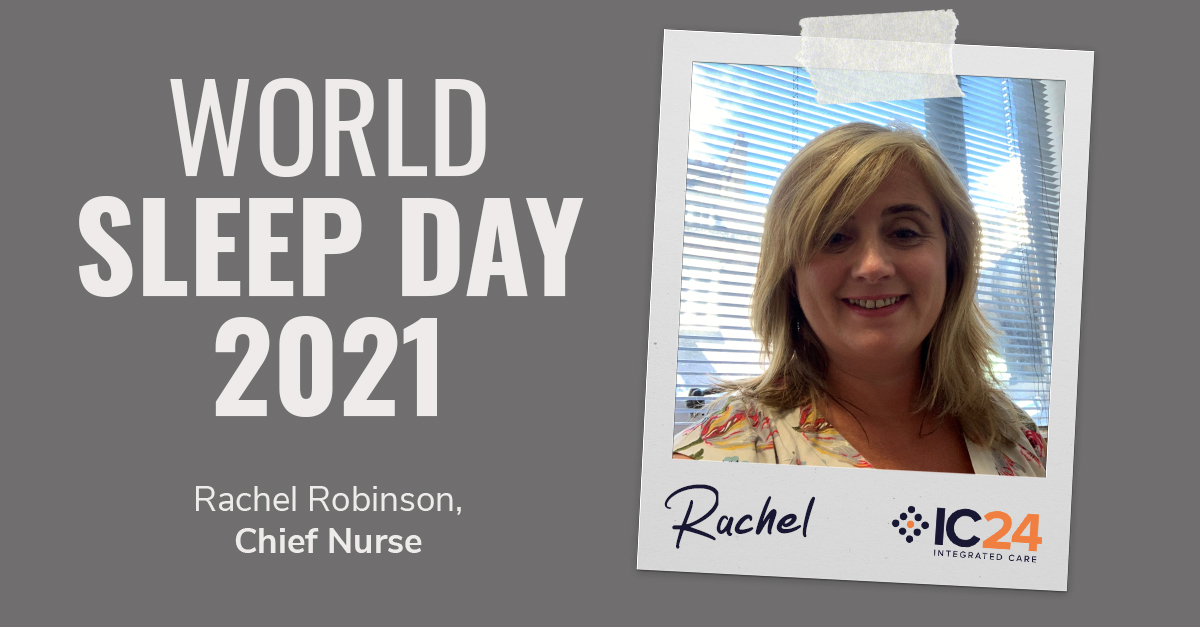World Sleep Day 2021
For World Sleep Day 2021, Rachel Robinson, Chief Nurse at IC24, gives us some top tips for improving sleep patterns.
by Rachel Robinson - Chief Nurse

World Sleep Day 2021
Sleep is an essential function that allows our bodies and minds to recharge. In this short blog post, Rachel Robinson, Chief Nurse at IC24, discusses why a good night’s sleep is so important. Rachel also gives us some top tips on how to create the best sleep routine and environment.
What is World Sleep Day?
World Sleep Day is an annual event dedicated to raising more awareness on the various sleep problems we can experience. The subject of getting a good night’s sleep has been a popular one as of late, due to the ongoing effects of the virus. In August 2020, it was reported that the number of those suffering with sleep loss rose from one in six to one in four (1).
For those of you who work in the healthcare arena like me, working shifts is an age-old tradition which ensures continuous care for patients. Working a 'non-traditional' schedule can affect sleep, as it can conflict with your natural sleep-wake rhythm. I particularly suffered the effects of this when my children were very young, as I chose to work night shifts to aid childcare.
Why is sleep so important?
When it comes to your health, sleep is a vital component of your overall wellbeing, and is as important as eating, drinking, and breathing. Whilst you’re asleep, your body is taking the time to rest, recover and rebuild so it can perform at its best the next day.
What can you do to improve sleep patterns?
Following a regular sleep routine – Erratic sleep patterns can leave you feeling out of sync, so a regular sleep routine can be one of the best methods for improving sleep quality. Whether you work night shifts, or work a '9 to 5', try to be as consistent as possible with your bedtime and wake times. As with any routine, life will inevitably interfere, but try your hardest not to indulge too much when it comes to sleeping in. When you become accustomed to your new sleep routine, you should find it easier to fall asleep and wake up.
Exercise and sleep - I'm a great advocate for regular exercise and there's been several studies that link the benefits of regular exercise and improved sleep quality. See our most recent blog post for four top tips to help you get more active.
Unwinding before bed – We all deal with daily stresses and pressures, but sometimes it can be hard to put these to bed before falling into a deep slumber. If your mind is racing with everything you need to do tomorrow, sit down, and write a list. You could also keep a notebook close to your bed in case you think of further thoughts. Another tip is putting your phone on ‘Do not disturb’ or airplane mode. When your phone stops buzzing, you’re able to be present and wind down for the evening. Other tips include sipping on some calming camomile tea, reading a light-hearted book, or taking a soothing bath. We have so many technology applications at our disposal to help us unwind, I'm particularly fond of an Audible book before sleep.
Creating a restful sleeping environment – An ideal sleep environment should be cool, relaxing, and quiet. Turning your bedroom into a sanctuary of relaxation is easier to do when you understand how these factors determine the quality of your sleep. The temperature of your bedroom can make a significant difference to your sleep quality. Studies have shown a connection between cool temperatures and deep sleep. This is because when your body temperature rises, it activates your natural awakened state and brings you out of your sleep.
When creating a quiet sleep environment, it’s also key to reduce distracting noises. Although we may not have control over all sounds, most noises can be reduced. If you’re sensitive to noise, then try using earplugs or a white noise application.
It’s also ideal to have a sleep environment which is relaxing. When it comes to making a bedroom calming, this will always depend on your personal preferences. If you’re stuck for ideas, then why not consider light wall colours, soft and comfortable bedding, or soothing aromatherapy scents?
Further advice and support
Whether you’re supporting someone with a sleep problem or have one yourself, having access to advice and support is crucial. Please see the below resources for further support:
The Sleep Charity
NHS UK
Mental Health Foundation
References
(1) https://www.theguardian.com/society/2020/aug/02/coronavirus-lockdown-increase-insomnia-uk-sleep-mothers (The Guardian, Sunday 2nd August 2020. Accessed 12th March 2021)